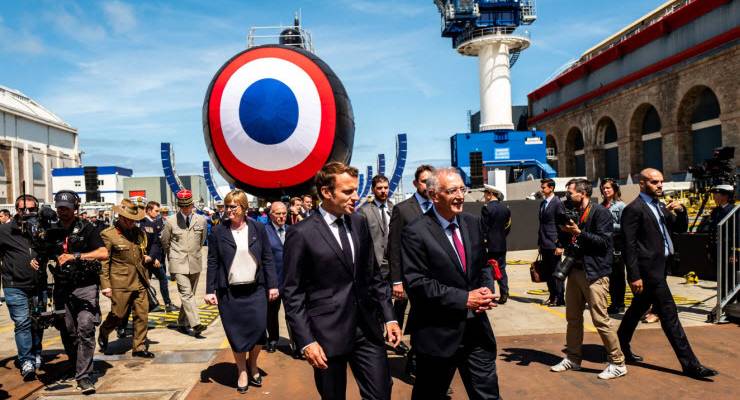
Is there still something to learn, a year on, from the mad tempest of the French subs saga? Not of the foibles of a former prime minister, or the ills of a complicated national security story (much has been written about those), but about the way we do international relations government-to-government?
French subs, or more precisely, a plan scrapped a year ago to build 12 of them for $50 billion, might have been utilised to grow transnational relationships in our region beyond the old Anglo block and with France and the European Union in particular.
Instead the Morrison government secretly devised an opt-out in favour of a very approximate schema for eight Anglo-American nuclear subs wrapped in the AUKUS agreement. The French cried foul. The Chinese — primed and not dissuaded, it seemed — rubbed their hands in delight at the show of division among key Western allies.
Twelve months later, those same Chinese hands are greasing the palms of their Russian counterparts as the largest single buyer of Russian energy to fund the Kremlin’s war in Ukraine. Specialists such as Nobel prize-winning economist Jean Tirole worry at the advent of a China-Russia trade bloc and the impact it would have — not least in the Asia-Pacific — on global supply chains, so raising tensions in international geopolitics.
But for the French the subs saga was less an economic story than one of geopolitics. This we basically missed in Australia. At Harvard Business School Philippe Le Corre pointed out that France’s Naval Group which was building the French boats was not at all short of contracts, effectively pooh-poohing the idea that the “emotionalism” of the French reaction was sour grapes over losing the contract.
In fact, France considered itself at the forefront of European strategy in the Indo-Pacific. And it was for this reason that it had so heavily invested in the Franco-Australian relationship. The deep humiliation it felt was commensurate with the extent of that investment.
Could cross-cultural trainers have been brought in to help? Certainly there was room for them, evident in the fact of the seemingly endless stream of Australian press articles agonising over the question of who said what to whom and when? This was after the opt-out. And before it? Well, hadn’t the French seen the hints that something with the contract was not right? Perhaps.
But the president of France does not take his cues about a state-sponsored commercial contract worth $50 billion from the low-level inferences of press articles. So from Canberra we were doubly ignorant: ignorant of the French mindset, and ignorant of the mistake of the conclusions we were consequently drawing.
Yet the French, too, were awry. China’s increasing menace and belligerence was already common currency in Australia, which probably explains why there was broad support — or at least acceptance — of the decision to acquire American nuclear boats. As a highly respected Australian observer told me, even five years ago that would simply not have been an option politically. My suspicion, based on the comments of French government sources as well as journalists, is that the French simply didn’t sense the Chinese threat that Australia was feeling.
How to have stopped the whole thing unravelling so dramatically? To prevent the drama and lost time of something similar happening again, around, say, current negotiations for an Australian-EU free trade agreement?
If genuine relationships had existed at the top of government, the prime minister (or president) would have picked up the phone and had their calls taken (rather than allegedly leak a telephone message). With trust, empathy and an obviously positive attitude to one’s opposite both sides would have known long before something was wrong, that something was wrong. Or more precisely: had the means of knowing long before something was wrong, that something was wrong. Call it, awareness. Simple, no? But apparently not easy.
Prime Minister Anthony Albanese may be better than Scott Morrison at the kind of relational diplomacy that French President Emmanuel Macron clearly favours (witness his attempts at getting in “close and personal” with Vladimir Putin and Donald Trump). Albeit important, the idea of a reset simply on the basis of a prime ministerial visit, or possible return visit by the French president mid-November with its attendant associations of flicking a switch is only part of the equation.
The cyclical stuff of experience also needs to be injected in there: to do, review, conclude and plan, so effectively do anew. To comprehend the why of one’s interlocutors by understanding with them, not about them, as humanist psychologist Carl Rogers described it.
Caricature their views and you start to see them as caricatures, too: “emotional”, “arrogant”, reflexively “pro-American” or whatever. That’s to say, see them in terms of not what but who they are against the background of the culture they carry. Mere “decency” while according “courtesy” and “respect” are just the tenets of good behaviour. And a given.
They are also not enough.
Yes, the Ukraine War, deteriorating security environment and Australia’s relative return to the mainstream on climate change has brought both countries closer together. But meaningfully repairing with France over the long term is going to require real engagement, creative thinking, and genuine dialogue around what can be offered with timelines, fixed objectives and regular review.








Crikey is committed to hosting lively discussions. Help us keep the conversation useful, interesting and welcoming. We aim to publish comments quickly in the interest of promoting robust conversation, but we’re a small team and we deploy filters to protect against legal risk. Occasionally your comment may be held up while we review, but we’re working as fast as we can to keep the conversation rolling.
The Crikey comment section is members-only content. Please subscribe to leave a comment.
The Crikey comment section is members-only content. Please login to leave a comment.